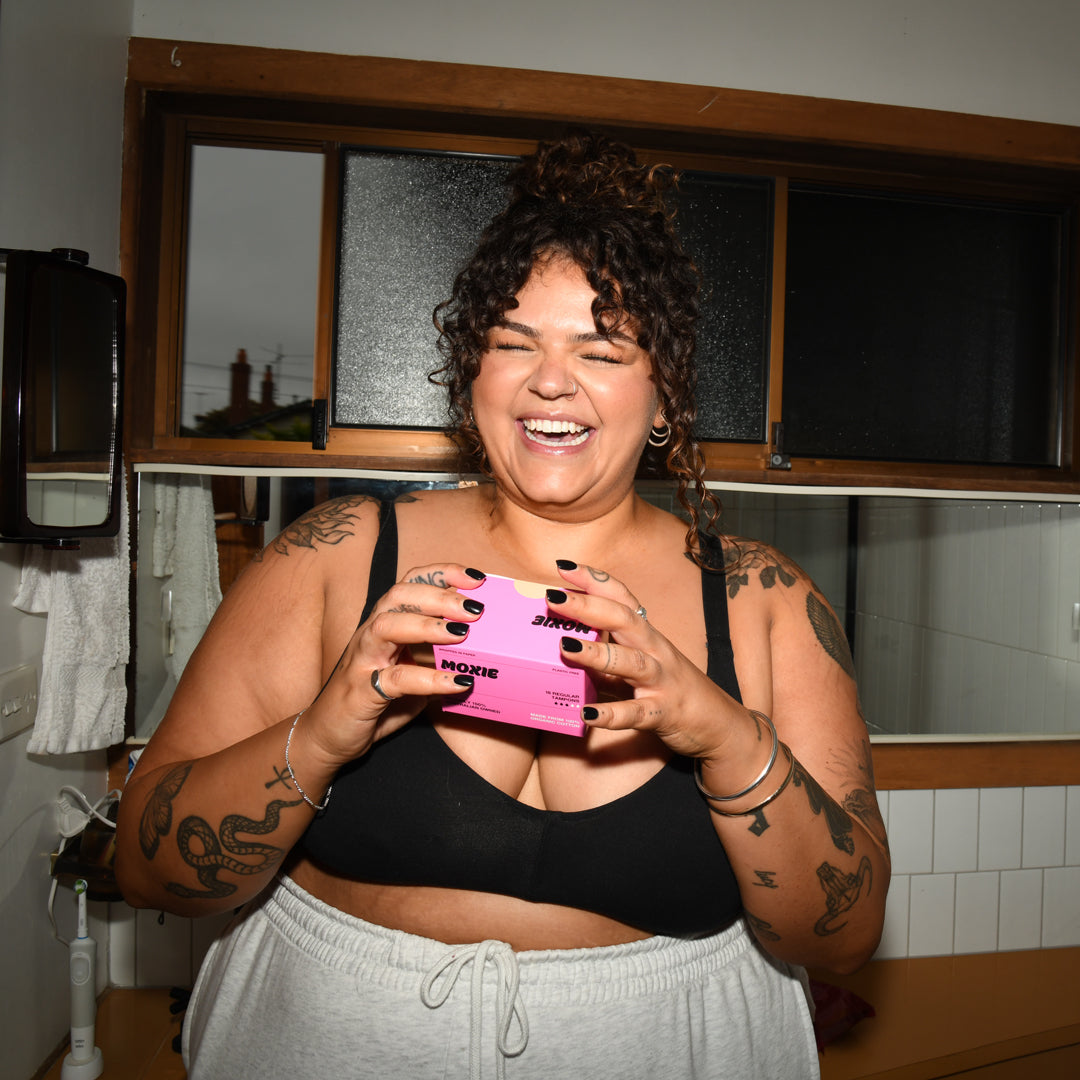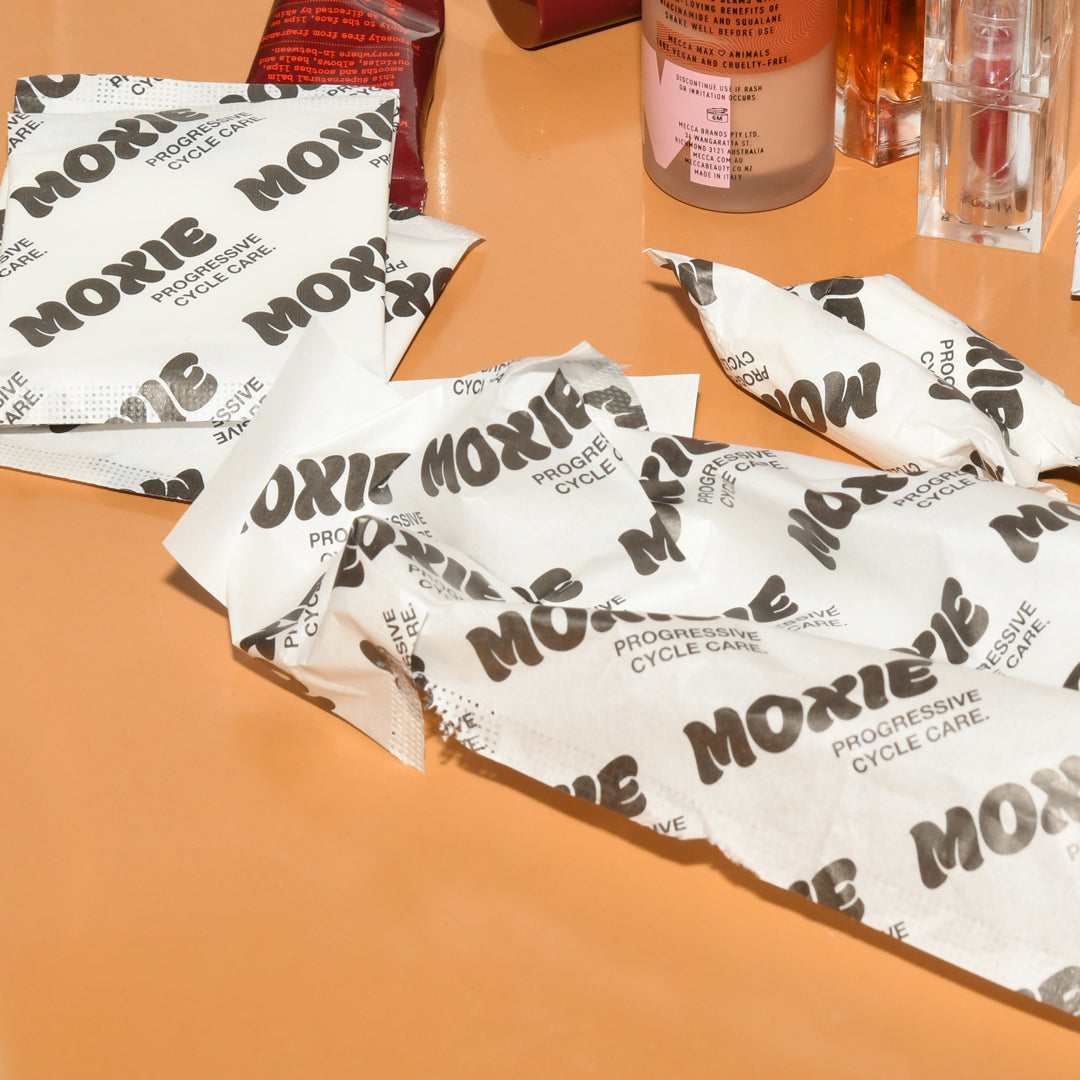Why do I have a heavy period and how do I stop it?

Image by Clem Onojeghuo, via Unsplash.
Do you have one of those periods that will just not.stop.pouring? (out of you, that is)? If you find yourself changing your pad or tampon every hour or so, or you feel like you just can't leave the house for fear of leaking through your clothes, you're not alone, Moxette - you may be one of the 1 in 5 women* experiencing menorrhagia, a.k.a. a heavy period.
Many menstruators will go through life not realising that super heavy periods aren't actual normal, and may be a sign that there's something underlying going that needs some further investigation from your health practitioner. In this piece, we're diving into the world of heavy periods – decoding the mysteries behind what causes them, how to manage them like a period pro, and when it's time to get things checked out by your doctor.
WHY IS MY PERIOD SO HEAVY?
A heavy period, or menorrhagia, can be triggered by various factors, like hormonal imbalances, uterine fibroids, polyps, or even underlying health conditions like thyroid disorders can contribute. Stress, certain medications, and lifestyle factors may also play a role.
WHAT IS CONSIDERED A HEAVY PERIOD?
A period is typically deemed heavy if you're changing tampons or pads every hour or two, experiencing 'flooding' (you leak through your period care and/or your clothes) or you're passing large clots in your menstrual blood ('large' in this context would be considered as bigger than an Aussie 50c coin). Bleeding for more than seven days, needing to use double protection (like a tampon and a pad at the same time) or having to stay home/being interrupted from your daily activities because of your heavy flow may also indicate heaviness.
WHAT DOES IT MEAN IF THERE ARE CLOTS?
Clots during menstruation are usually a result of heavy bleeding. They're formed when blood accumulates and clumps together in the uterus before being expelled through the vagina. While some clots are considered normal (as in, they don't happen that often and are small in size), large ones (i.e. bigger than an Aussie $1 coin) and those that occur frequently could signify menorrhagia or other underlying issues (like endometriosis or PCOS - though see your doctor for a proper diagnosis).
WHAT CAUSES HEAVY PERIODS?
Heavy periods can stem from various causes, like hormonal imbalances (particularly estrogen and progesterone, are common culprits), uterine fibroids, polyps, pelvic inflammatory disease (PID), even genetic bleeding disorders - though endometriosis, and adenomyosis can also lead to excessive bleeding.
ARE THERE ANY PARTICULAR FOODS THAT CAUSE HEAVY PERIODS?
Certain foods can exacerbate heavy periods. Foods high in caffeine, alcohol, and salt can worsen bloating and fluid retention, aggravating menstrual symptoms. On the other hand, incorporating iron-rich foods like leafy greens and lean meats may help manage heavy bleeding.
CAN HEAVY PERIODS CAUSE ANAEMIA?
Yes, heavy periods can indeed lead to anemia. When you experience heavy menstrual bleeding, you lose more blood and iron than your body can replace. Iron deficiency anemia can develop over time due to this ongoing loss of iron. Symptoms of anemia may include fatigue, weakness, pale skin, shortness of breath, and dizziness - if you're experiencing any of those, consult with your healthcare provider so that they can provide you with some guidance on managing your condition.
HOW DO I STOP HAVING SUCH A HEAVY PERIOD?
Firstly, it's important to understand what is causing your period to be heavy in the first place - this may involve a visit to your doctor, a chat about your menstrual cycle and associated medical history, and maybe even some tests. Your doctor may refer you on to a specialist if they think your symptoms need further investigating.
Managing heavy periods ultimately involves addressing underlying causes and possibly even adopting lifestyle changes. Hormonal birth control (like the oral contraceptive pill), nonsteroidal anti-inflammatory drugs (NSAIDs), and tranexamic acid are commonly prescribed medicines, but these will be discussed with your doctor if they think they may be suitable for you. Lifestyle adjustments such as stress management and dietary changes may also help to alleviate symptoms - but again, it depends what the cause is!
HEAVY PERIODS AND PREGNANCY
DOES A HEAVY FLOW AFFECT FERTILITY?
While heavy periods don't necessarily impact fertility on their own, underlying conditions, like endometriosis, PCOS, or fibroids causing menorrhagia, might. If you're concerned about your fertility, consult a healthcare provider for evaluation and further guidance.
I HAVE HAD A HEAVY PERIOD BUT A POSITIVE PREGNANCY TEST?
Experiencing heavy bleeding but still testing positive for pregnancy can be worrying. This could indicate what is known as "implantation bleeding" (which we talk a bit about on TikTok), where the fertilised egg implants into the uterine lining, causing light bleeding. However, heavy bleeding during pregnancy should always be evaluated by a healthcare professional.
IS IT NORMAL TO EXPERIENCE A HEAVY PERIOD AFTER PREGNANCY?
Yes, it's common for your period to become heavier after childbirth. This change is often due to hormonal shifts and your body readjusting post-pregnancy. So, if you notice a surge in flow after giving birth, know that it's pretty normal. If you're concerned about the intensity of your period, it's always best to touch base with your healthcare provider for reassurance and guidance.
Remember not to confuse this with postpartum bleeding, known as lochia, which is normal after childbirth. "Your flow after giving birth can last up to six (6) weeks," says Sydney-based Obstetrician and Gynaecologist Dr. Nicole Stamatopoulos. "It starts like a heavy period but can decrease in flow quite quickly, sometimes within a week," she adds. However, if bleeding remains heavy or persists beyond the six/eight week mark (and is not your regular period), it's important to consult a healthcare provider ASAP.
WHAT PRODUCTS ARE BEST FOR A HEAVY FLOW?
Managing a heavy flow requires comfortable, reliable menstrual products, like super-absorbent pads, tampons designed for heavy flow, period underwear or even a combination might help provide adequate protection for someone experiencing a heavy flow. Menstrual cups are also popular, as they offer a high capacity and longer-wear comfort without having to change as often as a pad (due to their capacity - please always read the instructions for use and ensure you are following these). It's not a one-size-fits-all, Moxette - every body and every flow is different, so you may need to experiment with different products to find what works best for you and your lifestyle.
Some final thoughts from your Moxie fam...
If in doubt, ALWAYS get checked out! The information provided here and anywhere on our site is to inform and educate only - this does not constitute, nor should it replace, a personalised medical diagnosis from your doctor. If you have any queries or concerns relating to your period in any way, please consult your own trusted medical practitioner for advice. x
*Statistic via www.healthdirect.gov.au/heavy-periods



